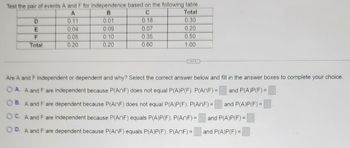
A First Course in Probability (10th Edition)
10th Edition
ISBN: 9780134753119
Author: Sheldon Ross
Publisher: PEARSON
expand_more
expand_more
format_list_bulleted
Question

Transcribed Image Text:Test the pair of events A and F for independence based on the following table.
A
B
C
Total
0.11
0.01
0.18
0.30
0.04
0.09
0.20
0.05
0.10
0.50
0.20
0.20
1.00
D
E
F
Total
0.07
0.35
0.60
(...)
and P(A)P(F) = |
Are A and F independent or dependent and why? Select the correct answer below and fill in the answer boxes to complete your choice.
OA. A and F are independent because P(AnF) does not equal P(A)P(F). P(AnF)=
B. A and F are dependent because P(AnF) does not equal P(A)P(F). P(AnF)=
OC. A and F are independent because P(AnF) equals P(A)P(F). P(AF) =
OD. A and F are dependent because P(AnF) equals P(A)P(F). P(AnF) =
and P(A)P(F) =
and P(A)P(F) =
and P(A)P(F)=
Expert Solution
This question has been solved!
Explore an expertly crafted, step-by-step solution for a thorough understanding of key concepts.
This is a popular solution
Trending nowThis is a popular solution!
Step by stepSolved in 2 steps with 2 images

Knowledge Booster
Similar questions
- Solvearrow_forwardBar exam has below passing rates: 1st time passing: 28% 2nd time passing: 88% Find the probability pass the bar exam. 8.64% 91.36% 86.43% 95.76%arrow_forwardBelow, the two-way table is given for a class of students. Freshmen Sophomore Juniors Seniors Total Male 2. Female Total If a student is selected at random, find the probability the student is a freshman. P( Freshman ) =[? ]% Round to the nearest whole percent. Enter DELL home prt sc F10 end F12 F5 F6 F7 Inse F8 F9 F11 6 8. 9.arrow_forward
- Test the pair of events B and E for independence based on the following table. A B с Total 0.22 0.18 0.10 0.50 0.10 0.03 0.07 0.20 0.18 0.09 0.03 0.30 0.50 0.30 0.20 1.00 D E F Total Are B and E independent or dependent and why? Select the correct answer below and fill in the answer boxes to complete your choice. O A. B and E are independent because P(BOE) equals P(B)P(E). P(BNE)= and P(B)P(E)= B. B and E are dependent because P(BNE) does not equal P(B)P(E). P(BnE)= OC. B and E are independent because P(BOE) does not equal P(B)P(E). P(BOE)= O D. B and E are dependent because P(BOE) equals P(B)P(E). P(BOE) = and P(B)P(E)= and P(B)P(E)= and P(B)P(E)=arrow_forwardUse the data in the following table, which lists drive-thru order accuracy at popular fast food chains. Assume that orders are randomly selected from those included in the table. Drive-thru Restaurant с D Order Accurate 234 144 Order Not Accurate 38 19 If one order is selected, find the probability of getting an order that is not accurate. A 340 36 B 280 53 The probability of getting an order that is not accurate isarrow_forwardK Use the data in the following table, which lists drive-thru order accuracy at popular fast food chains. Assume that orders are randomly selected from those included in the table. Drive-thru Restaurant C 242 36 A 329 30 B 274 57 D Order Accurate 146 Order Not Accurate 10 If one order is selected, find the probability of getting an order from restaurant B or D or an order that is not accurate. The probability of getting an order from restaurant B or D or an order that is not accurate is (Round to three decimal places as needed.)arrow_forward
- Watch help video Given that events A and B are independent with P(A) = 0.1 and P(B) = 0.33, determine the value of P(An B), rounding to the nearest thousandth, if necessary. 2 Answer: W S X #m 3 e d CA $ 4 C C r f V % 5 Submit Answer g 6 t y Oll b h hp 18 7 n u * 8 attempt 1 out of 2 m +0 k O 1arrow_forwardT7arrow_forwardGiving a test to a group of students, the grades and gender are summarized below. Round your answers to 4 decimal places. Grades and Gender A B с Total Male 45 Female 18 4 25 Total 20 33 17 70 If one student is chosen at random, a. Find the probability that the student got a C: b. Find the probability that the student was male AND got a "C": c. Find the probability that the student was female OR got a "C": d. If one student is chosen at random, find the probability that the student was male GIVEN they got a 'C':arrow_forward
arrow_back_ios
arrow_forward_ios
Recommended textbooks for you
 A First Course in Probability (10th Edition)ProbabilityISBN:9780134753119Author:Sheldon RossPublisher:PEARSON
A First Course in Probability (10th Edition)ProbabilityISBN:9780134753119Author:Sheldon RossPublisher:PEARSON

A First Course in Probability (10th Edition)
Probability
ISBN:9780134753119
Author:Sheldon Ross
Publisher:PEARSON
